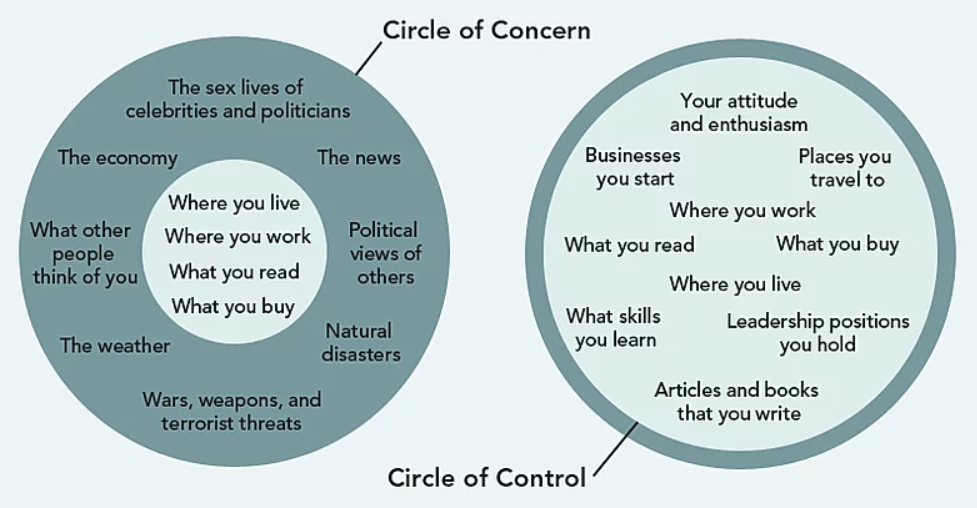What we focus on or pay attention to is a key determinant of how anxious, or how calm, we are in any situation – from job interviews to coronaviruses.
If you tend to focus on things you do not control, you’ll feel more anxious in general, because the brain evolved to dislike uncertainty.
But if you develop a habit of finding and focusing on the things you can control, you will feel more certainty, calmness and clarity in any given situation. There are always things you can control in any situation – although sometimes you may need to look harder to find them.
I’ll show you how it works using a model from Stephen Covey’s The 7 Habits of Highly Effective People.

Our Circle of Control is all the stuff we pay attention to which we can control (light coloured background in the picture). Our Circle of Concern is the stuff we focus on which we do not control (dark green background in the picture). The bigger our circle of control gets, the smaller our circle of concern gets, and vice-versa – because we can only focus on so many things at once.
On the left is a person with a big circle of concern, therefore a small circle of control. They will feel more anxious, nervous and exhausted, because they focus on so many things they cannot control.
On the right is a person with a large circle of control, therefore a small circle of concern. They will feel more certainty, more in-control, and calmer overall because their attention is on things they can control.
So, a key way to reduce anxiety and feel calmer is to find and focus on the things we can control, growing our circle of control and shrinking our circle of concern. Over time, you will feel more certainty, calmer and more in-control.
For example, consider:
What are the top 3 things you could do to improve your current situation?
How can you adapt your lifestyle to enjoy life better during coronavirus lockdown?
How can you adapt your business or work to be more effective at the moment?
As you begin answering questions like those, you are already moving your focus on to things you can control.
But focusing on things you control isn’t only about your thoughts: It’s about taking action as well. Perhaps you’ve decided getting more exercise would be a great way to improve your lifestyle: It’s a great idea, but you need to take action to continue growing your circle of control. (If you don’t take action, your attention will be on other things like “I’m so lazy, why don’t I get started!”, which does not feed your circle of control.)
It might also help to reduce how much news you watch, because the problems on the news are probably things you cannot directly control.
Growing your circle of control may require effort at first, but it gets easier. Like any habit, you start doing it unconsciously and automatically.
So, start noticing how much you’re focusing on things you can control, versus things you cannot control. If you decide it would help to grow your circle of control, you could start by grabbing a pen and start answering the 3 bullet points above (or any similar questions that would serve you). Then take action to make your plans reality.
Remember, there are always things you can control in any situation.
If you’d like more help in growing your circle of control, reducing anxiety and getting calmer again, feel free to email me.





